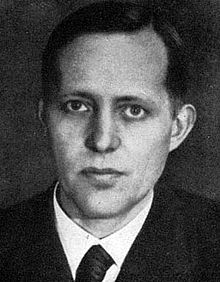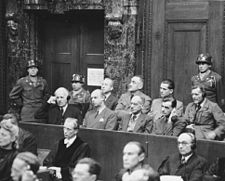- Lutz Graf Schwerin von Krosigk
-
Johann Ludwig Graf Schwerin von Krosigk 
Leading Minister of the German Reich In office
1 May – 23 May 1945President Karl Dönitz Preceded by Joseph Goebbels (Chancellor) Succeeded by Konrad Adenauer (Chancellor) Foreign Minister In office
2 May – 23 May 1945President Karl Dönitz Chancellor Himself (Leading Minister) Preceded by Arthur Seyss-Inquart Finance Minister In office
1 June 1932 – 23 May 1945President Paul von Hindenburg (1932-1934)
Adolf Hitler (Führer, 1934-1945)
Karl Dönitz (1945)Chancellor Franz von Papen (1932)
Kurt von Schleicher (1932-1933)
Adolf Hitler (1933-1945)
Joseph Goebbels (1945)
Himself (Leading Minister, 1945)Preceded by Hermann R. Dietrich Personal details Born 22 August 1887 Died 4 March 1977 (aged 89) Political party None Alma mater University of Halle
University of Lausanne
University of OxfordOccupation Soldier (Officer), Nobleman Johann Ludwig Graf Schwerin von Krosigk, known as Lutz Graf Schwerin von Krosigk (22 August 1887 – 4 March 1977) was a German jurist and senior government official, who served during May of 1945 in the historically unique position of Leading Minister of the German Reich, the equivalent of a Chancellorship in the short-lived Flensburg government of Reich President Karl Dönitz. Schwerin von Krosigk was also Foreign Minister in the provisional government, an office which had next to no purpose given the state of Germany and its administration at the time. In addition, he remained at his post as Finance Minister of Germany, which he had assumed in 1932 (under Reich Chancellor Franz von Papen) and held throughout the span of the Third Reich. Besides Adolf Hitler himself, he and Wilhelm Frick were the only members of the Third Reich's cabinet to serve continuously from Hitler's appointment as Chancellor until his death.
Contents
Early life
He was born Johann Ludwig von Krosigk in Rathmannsdorf, Anhalt, Germany to a father from an old noble family of Anhalt and a mother who was a daughter and heiress of a Count (Graf) von Schwerin. He studied law and political science at Halle, at Lausanne and as a Rhodes Scholar at Oxford University. During World War I, he served in the German Army, finally as a First Lieutenant, and was awarded the Iron Cross. In 1918, Krosigk married Baroness Ehrengard von Plettenberg (1895-1979), with whom he had four sons and five daughters. In 1922 he became an Oberregierungsrat (senior government official) and 1929, ministerial director and superior of the budget department at the German Reichs finance ministry. In 1931, he joined the department of reparations payments, formed to deal with the reparations Germany owed the Allied Powers after World War I.
During the Nazi years
Pre-World War II
Schwerin von Krosigk was appointed Minister of Finance by Franz von Papen in 1932, and continued in that office at the request of President Paul von Hindenburg under Kurt von Schleicher and throughout the period of Nazi rule. Several members of his family took part in assassination attempts against Adolf Hitler. Schwerin von Krosigk was rarely seen in public appearances and Hitler did not have regular Cabinet meetings.
World War II
Seated as a defendant in the Ministries Trial; Schwerin von Krosigk appears at the far right of the second row.)
On May 1, 1945, after Goebbels's suicide, President (Reichspräsident) Karl Dönitz asked Schwerin von Krosigk to become the Chancellor (Reichskanzler) of the Acting Government. He declined but did accept the position of "Leading Minister".
Rapidly advancing Allied forces limited the jurisdiction of the new German government to an area around Flensburg near the Danish border, where Dönitz's headquarters were located, along with Mürwik. Accordingly, this administration was referred to as the Flensburg government. Dönitz and Schwerin von Krosigk attempted to negotiate an armistice with the Western allies while continuing to resist the Soviet Army. On May 7, 1945, Dönitz authorized the signature of the German Instrument of Surrender to the Allies, which took place in Rheims before General Dwight D. Eisenhower; Dönitz would later authorize the German military to sign another instrument of surrender in Berlin, in a ceremony presided over by the Soviets. The speech by Winston Churchill announcing victory to the British people is evidence of a de facto recognition of the Flensburg Government's authority, for Churchill stated that the surrender was authorized by "Grand Admiral Dönitz, the designated Head of the German State". However, after the unconditional surrender, the Flensburg government was mostly treated as inconsequential by the western military command. On May 23, 1945, a British liaison officer went to Dönitz's seat of government at Flensburg and asked to address the government. He then read an order from the Supreme Commander dissolving the government and ordering the arrest of its members.
Schwerin von Krosigk was tried at Nuremberg along with other leading members of the German government during the time of Nazi government. Found guilty in the Ministries Trial in 1949, he was sentenced to ten years' imprisonment, but was released during an amnesty in 1951.
After World War II
In later years Schwerin von Krosigk wrote several books on economic policy, as well as two versions of his memoirs. He was one of the first to refer to an "Iron Curtain" coming down across Europe, in a broadcast to the German people on May 2, 1945, a phrase which he had picked up from an article by Joseph Goebbels,[1] and which was later made famous by Winston Churchill.
Schwerin von Krosigk died in 1977 in the city of Essen, North Rhine-Westphalia, West Germany, at the age of 89.
Works
- Es geschah in Deutschland, 1951
- Die große Zeit des Feuers - Der Weg der deutschen Industrie, 3 volumes, 1959
- Alles auf Wagnis - der Kaufmann gestern, heute und morgen, 1963
- Persönliche Erinnerungen, memoirs, 3 volumes, 1974
- Staatsbankrott (Studie über die deutsche Finanzpolitik von 1920 bis 1945), 1975
- Memoiren (short version of Persönliche Erinnerungen), 1977
Footnotes
- ^ 'Das Jahr 2000,' Das Reich, 25 February 1945, pp. 1-2
Terminology note
- Regarding personal names, Graf is a German noble title, translated as Count, but is now (since 1918, the end of the German monarchy) seen as part of the person's family name. The feminine form is "Gräfin".
External links
 Media related to Lutz Graf Schwerin von Krosigk at Wikimedia Commons
Media related to Lutz Graf Schwerin von Krosigk at Wikimedia Commons- Biography (Deutsches Historisches Museum Berlin)
Political offices Preceded by
Hermann R. DietrichMinister of Finance
1932–1945Succeeded by
Fritz Schäffer (West Germany)
Hans Loch (East Germany)Preceded by
Joseph Goebbels
(as Chancellor of Germany)Leading Minister of Germany
(Flensburg government)
1–23 May 1945Succeeded by
Allied military occupation 1945-1949
Konrad Adenauer (West Germany)
Otto Grotewohl (East Germany)Preceded by
Arthur Seyss-InquartMinister of Foreign Affairs
1–23 May 1945Succeeded by
Konrad Adenauer (West Germany)
Georg Dertinger (East Germany)Chancellors of Germany North German Confederation 
(1867–1871)German Empire 
(1871–1918)Weimar Republic 
(1919–1933)Third Reich 

(1933–1945)- Adolf Hitler
- Joseph Goebbels
- Count Schwerin von Krosigk (as Leading Minister)
Federal Republic 
(1949–)Finance Ministers of Germany German Empire
(1871–1918)
Adolf von Scholz · Franz Emil Emanuel von Burchard · Karl Rudolf Jacobi · Baron Helmuth von Maltzahn · Arthur von Posadowsky-Wehner · Max Franz Guido von Thielmann · Baron Hermann von Stengel · Reinhold Sydow · Adolf Wermuth · Hermann Kühn · Karl Helfferich · Count Siegfried von Roedern
Weimar Republic
(1918–1933)
Eugen Schiffer · Bernhard Dernburg · Matthias Erzberger · Joseph Wirth · Andreas Hermes · Rudolf Hilferding · Hans Luther · Otto von Schlieben · Hans Luther · Peter Reinhold · Heinrich Köhler · Rudolf Hilferding · Paul Moldenhauer · Heinrich Brüning · Hermann R. Dietrich
Third Reich
(1933–1945) Count Lutz Schwerin von Krosigk
Count Lutz Schwerin von KrosigkEast Germany
(1949–1990)
Hans Loch · Willy Rumpf · Siegfried Böhm · Werner Schmieder · Ernst Höfner · Uta Nickel · Walter Romberg · Werner Skowron
Federal Republic of Germany
(1949–)
Fritz Schäffer · Franz Etzel · Heinz Starke · Rolf Dahlgrün · Kurt Schmücker · Franz Josef Strauss · Alex Möller · Karl Schiller · Helmut Schmidt · Hans Apel · Hans Matthöfer · Manfred Lahnstein · Gerhard Stoltenberg · Theodor Waigel · Oskar Lafontaine · Hans Eichel · Peer Steinbrück · Wolfgang Schäuble
Foreign Ministers and Foreign Secretaries of Germany German Empire
(1871–1918) Thile · Balan · B.E. v. Bülow · Radowitz · Hohenlohe-Schillingsfürst · Limburg-Stirum · Busch · Hatzfeld zu Trachenberg · H. v. Bismarck · Bieberstein · B. von Bülow · Richthofen · Tschirschky-Bögendorff · Schoen · Kiderlen-Waechter · Jagow · Zimmermann · Kühlmann · Hintze · Solf · Brockdorff-Rantzau
Thile · Balan · B.E. v. Bülow · Radowitz · Hohenlohe-Schillingsfürst · Limburg-Stirum · Busch · Hatzfeld zu Trachenberg · H. v. Bismarck · Bieberstein · B. von Bülow · Richthofen · Tschirschky-Bögendorff · Schoen · Kiderlen-Waechter · Jagow · Zimmermann · Kühlmann · Hintze · Solf · Brockdorff-RantzauWeimar Republic
(1918–1933)
Nazi Germany
(1933–1945)
German Democratic Republic
(East Germany) (1949–1990)
Federal Republic of Germany
(since 1949) Adenauer · Brentano · Schröder · Brandt · Scheel · Genscher · Kinkel · J. Fischer · Steinmeier · Westerwelle
Adenauer · Brentano · Schröder · Brandt · Scheel · Genscher · Kinkel · J. Fischer · Steinmeier · WesterwelleMembers of Hitler's cabinet - Franz von Papen (ind)
- Hermann Göring
- Konstantin von Neurath
- Joachim von Ribbentrop
- Martin Bormann
- Joseph Goebbels
- Wilhelm Frick
- Rudolf Hess
- Lutz Graf Schwerin von Krosigk (ind)
- Alfred Hugenberg (DNVP)
- Kurt Schmitt
- Hjalmar Schacht (ind)
- Walther Funk
- Franz Seldte
- Franz Gürtner (DNVP)
- Franz Schlegelberger
- Otto Georg Thierack
- Werner von Blomberg (ind)
- Wilhelm Keitel (ind)
- Paul Freiherr von Eltz-Rübenach (ind)
- Julius Dorpmüller
- Wilhelm Ohnesorge
- Richard Walther Darré
- Herbert Backe
- Bernhard Rust
- Fritz Todt
- Albert Speer
- Alfred Rosenberg
- Hanns Kerrl
- Hermann Muhs
- Otto Meißner (ind)
- Hans Lammers
- Karl Hermann Frank
- Ernst Röhm
All personnel were or became NSDAP members except where indicated ("ind" = nominally independent) The Schwerin von Krosigk Cabinet – 2 May 1945 to 23 May 1945 Graf Schwerin von Krosigk (Chief Minister, independent) · Wilhelm Stuckart (NSDAP) · Albert Speer (NSDAP) · Franz Seldte (NSDAP) · Otto Georg Thierack (NSDAP) · Grand Admiral Dönitz (independent) (in his capacity as Reichskriegsminister) · Julius Heinrich Dorpmüller (NSDAP) · Herbert Backe (NSDAP)
Categories:- 1887 births
- 1977 deaths
- People from Staßfurt
- People from the Kingdom of Saxony
- People convicted by the United States Nuremberg Military Tribunals
- Chancellors of Germany
- German nobility
- German military personnel of World War I
- German Rhodes scholars
- German Roman Catholics
- University of Halle-Wittenberg alumni
- German prisoners and detainees
- Prisoners and detainees of the United States military
- World War II political leaders
- Foreign Ministers of Germany
- Nazi Germany ministers
- House of Hagen
Wikimedia Foundation. 2010.

